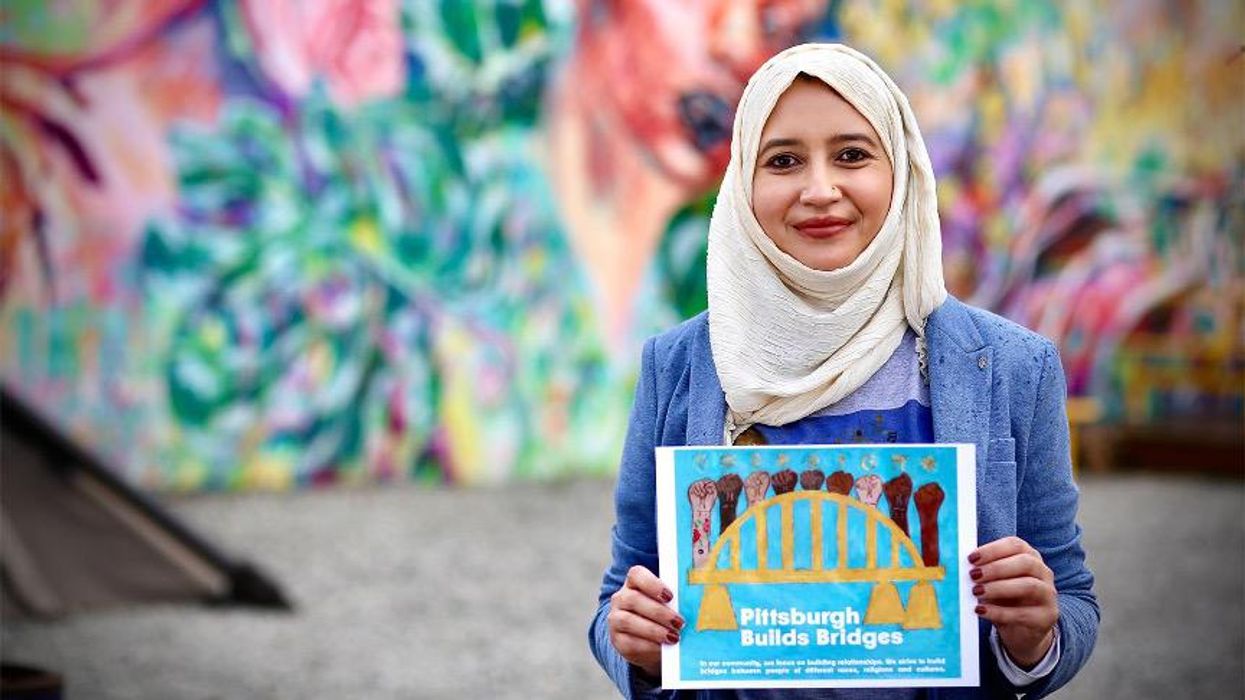Coyle is a retired minister who writes about the intersections of faith, culture and politics. She is the author of "Living in The Story: A Year to Read the Bible and Ponder God's Story of Love and Grace."
Pittsburgh is the home of 446 bridges, more than any other city in the world. The City of Bridges is also home to a small group of Muslims, only about 0.5% of the population. Maybe this minority status contributed to the 2018 attack on a high school Muslim woman wearing a hijab. This violence is one reason Ebtehal Badawi began her "Pittsburg Builds Bridges" art project.
Even though she herself is a Muslim, Badawi's bridge paintings depict symbols of nine religions and cultures demonstrating a wide range of worldviews. She believes, as I do, that differences need not divide us. Our diversity can make us stronger, kinder and wiser if we will ground ourselves in the basic truth of our common humanity.
"The reason these things happen, incidents of racism and bullying, is because people are afraid of people who are different," said Badawi. "We need to accept those who are different, people who don't look the same or share the same belief. We need to be open, to see the people in front of us."
We need to see the people in front of us.
This is where bridges come in handy. Bridges bring us nearer to one another, connecting those who may have been separated by distance or terrain, by experience or opinions. When we make the effort to find ways to move closer, then we are able to see, hear and understand more clearly.
Some years ago, I attended an event called Dallas Dinner Table, a conversation of strangers around a shared meal on Martin Luther King Jr.'s birthday. The bridges of understanding we built during that evening made us all stronger, kinder and wiser.
When I served as a local pastor in several different congregations, we would create occasional opportunities for church friends with diverse (and sometimes clashing) opinions to sit down together and tell their stories. Strengthening relationships, cultivating mutual respect, and appreciating the context of our various lives often allowed us to find a path through our disagreements.
Living Room Conversations broadens the opportunity to build bridges of community across cyberspace. Even when we are separated by multiple miles and numerous time zones, we get to "see the people in front of us," hear their stories and understand viewpoints that are different from our own.
But why would any of us do this bridge-building work when it's so very comfortable to stay safely within our own familiar territory? Badawi reminds us that violence is the price societies will pay when we allow ourselves to be fragmented and cut off from each other. Fear of "the other" will foster violence in thought, word, or deed in small and large ways. On the other hand, drawing near to another allows us to see the other, to recognize our shared humanity and (hopefully) to find there insight instead of fear.
Like my Muslim sister, as a Christian, I too ground my peacemaking efforts in my own religious faith. We both acknowledge that there are too many ways in which our various faith traditions have been misused to divide people instead of bringing people together, to foster animosity instead of cultivating love. We reject these kinds of misappropriations, and we will do whatever we can wherever we are to encourage our neighbors to break down barriers and to build bridges in their place.
I am grateful for the ways the Bridge Alliance effort is always seeking creative partners in this bridge-building business. Maybe you too are making similar efforts where you live. Maybe you see others in your community reaching out across divides. Will you tell us what you see where you are? Where do you find hope, courage, and wisdom in the midst of the challenges of our day? Where are your bridges?
A version of this article was first published at CharlotteVaughanCoyle.com.



















